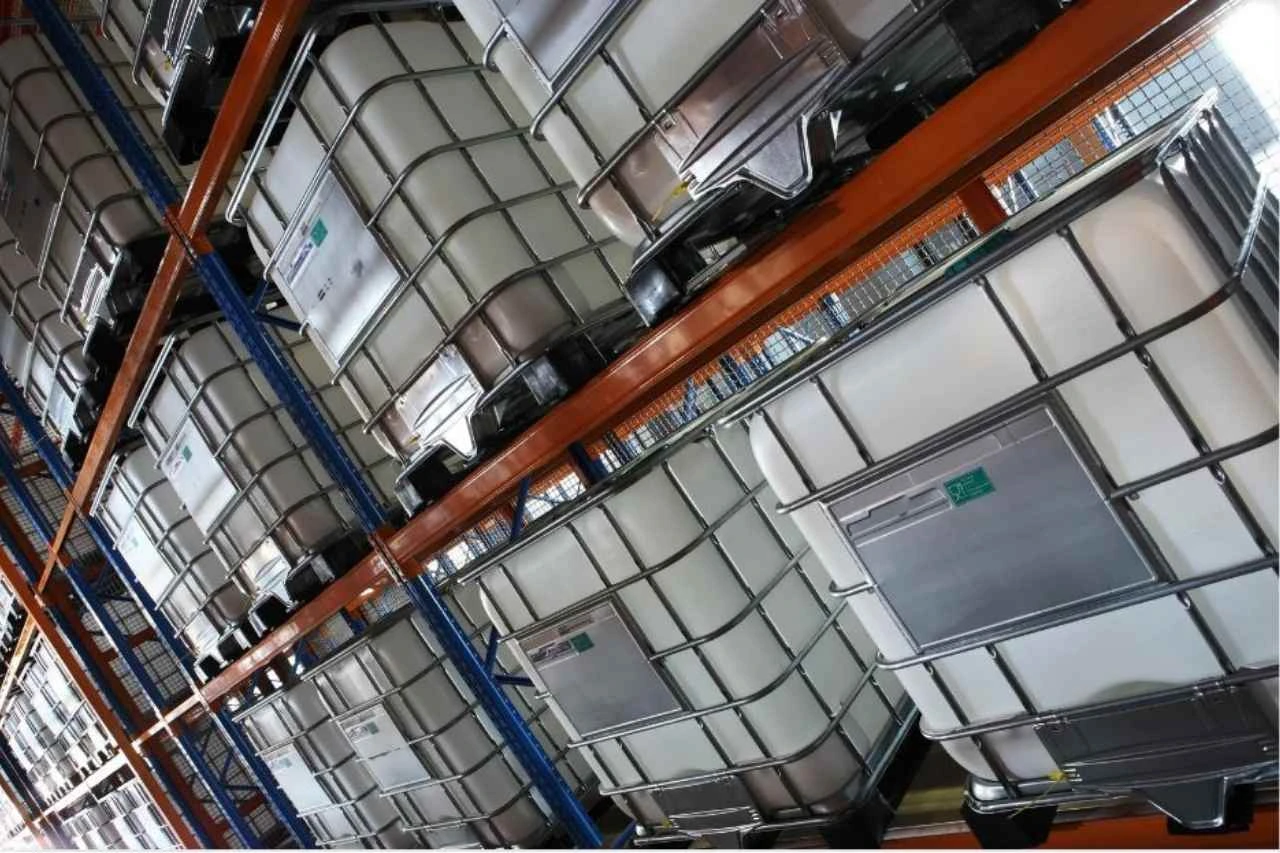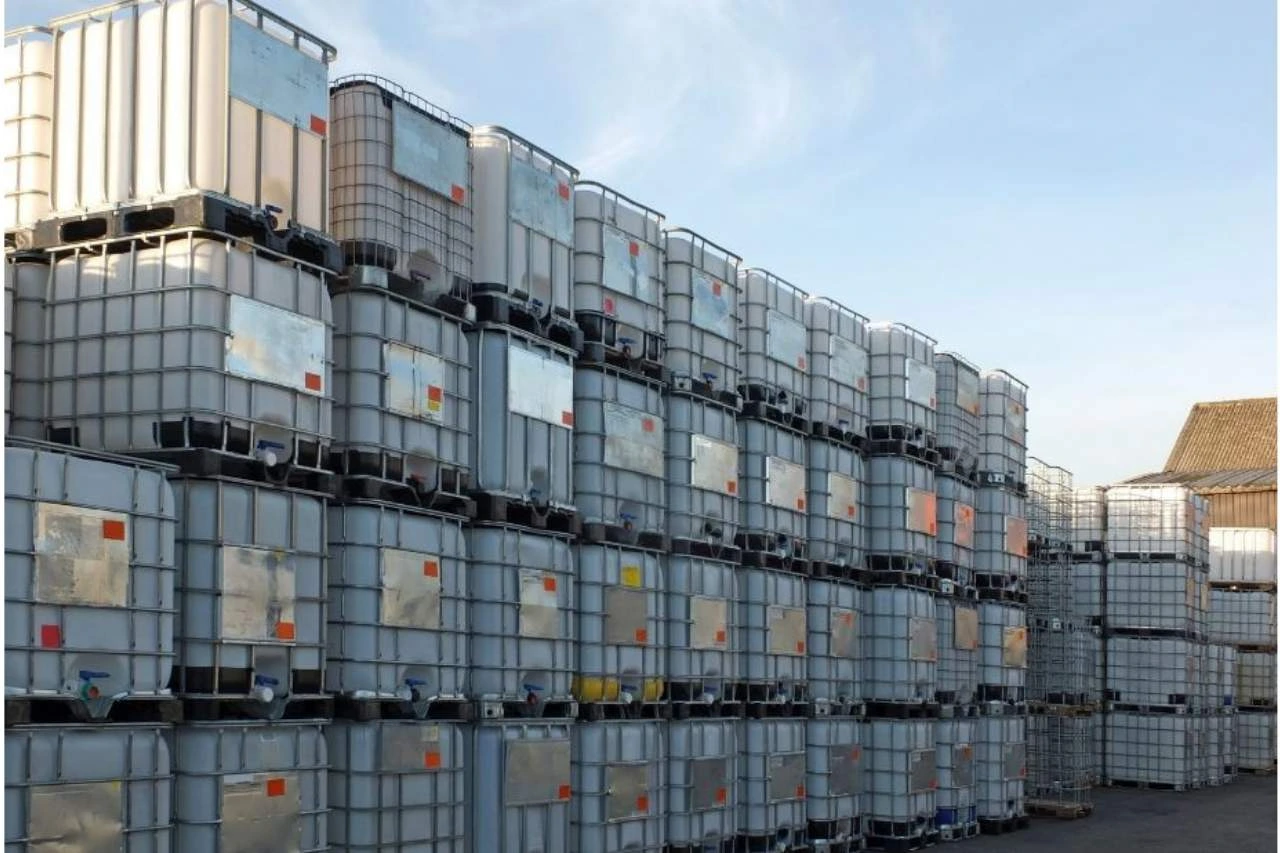IBC containers, also known as Intermediate Bulk Containers, are an important element for various industries. They are used in chemical, agriculture, food processing, pharmaceuticals, and many other industries. These versatile storage and transport units have revolutionised how businesses handle bulk liquids, semi-solids, and powders.
Read this blog to the end to learn more about IBC containers.
What is an IBC Container?
IBC stands for Intermediate Bulk Container. IBC containers are also known as IBC tote or pallet tanks. These large, pallet-mounted containers are best for the purpose of storing and transporting bulk liquids, pastes, semi-solids, and granular solids, generally between 275 to 330 gallons (1040 to 1250 liters). They are larger than standard drums but smaller than tank containers.
Types of IBC Containers
There are three main types of IBC Containers Rigid, Flexible and Composite IBC.
1. Rigid IBC Containers
These are the most common forms of IBCs. They feature a cage or composite frame made of steel or plastic, enclosing a high-density polyethylene (HDPE) bottle. These are highly durable and ideal for multiple uses, especially in industrial environments.
Key Features:
- Reusable and recyclable
- Designed for stacking
- Often have a bottom discharge valve
- Standard sizes for easy transport on pallets
2. Flexible IBCs (FIBCs)
Also known as bulk bags or big bags, these IBCs are made from woven polypropylene and are best suited for transporting dry goods like sand, grains, or powders.
Benefits:
- Lightweight
- Collapsible for space-saving storage
- Cost-effective for one-way transport
3. Composite IBCs
Composite IBCs are also called caged IBCs. These consist of a plastic inner container encased in a protective outer shell, typically a galvanized steel cage. They combine the benefits of both plastic and metal IBCs and are commonly used in chemical and hazardous material storage.
Key Features:
- Strong and impact-resistant design
- Suitable for hazardous chemical storage
- Reusable and cost-effective
James Cargo provides reliable freight forwarding, customs clearance, and shipping services to and from most parts of the world. Get in touch for expert support!
Materials Used in IBC Containers
The choice of material is critical depending on the application. Most IBCs are made using:
- High-Density Polyethylene (HDPE): Offers chemical resistance and food-grade compatibility.
- Stainless Steel: Excellent for food, pharmaceutical, and corrosive chemical applications.
- Galvanized Steel: Used for cage frames in composite IBCs, adding structural strength.
Advantages of Using IBC Containers
Let’s find out the benefits of using IBC Containers:
1. Space Efficiency
Their cube-like shape makes them space efficient, both in storage facilities and during transportation. Unlike round drums, IBCs reduce dead space.
2. Cost-Effective
IBC containers lower shipping and storage costs due to their high capacity and reusability. Their stackable design also reduces the required floor space.
3. Environmental Benefits
Many IBCs are reusable and recyclable, making them a more sustainable option compared to single-use containers.
4. Enhanced Safety
Equipped with secure lids and discharge valves, IBCs ensure safe and controlled dispensing of contents, minimising spills and contamination.

Common Industrial Applications
IBC containers are effectively used in the following industries or sectors:
1. Chemical Industry
Used to store and transport hazardous and non-hazardous chemicals, IBCs meet stringent regulatory standards for safety and containment.
2. Food & Beverage Industry
Food-grade IBCs are ideal for bulk liquids like syrups, oils, and juices, as well as dry goods such as sugar and flour.
3. Pharmaceutical Sector
Stainless steel IBCs are used to meet high hygiene standards, ensuring zero contamination in transporting sensitive ingredients.
4. Agriculture
Farmers use IBCs for fertilizers, pesticides, and water storage due to their durability and volume capacity.
Are IBC Containers Reusable?
Yes, most IBC containers are designed for multiple uses. However, proper cleaning and re-certification are necessary, especially if switching contents or dealing with hazardous materials
Reconditioning services are available where containers are thoroughly cleaned, inspected, and relabeled.
How IBC Containers Are Used in Shipping and Logistics
IBC containers are extensively used for domestic and international shipping. These containers are commonly employed in the transportation of hazardous chemicals, food ingredients, oils, paints, and more.
Key Applications of IBC Containers
- Chemical Transport: IBC containers used in chemical industry comply with ADR regulations. They offer safe containment for corrosive and flammable liquids, with reinforced caps and valves for controlled dispensing.
- Food-Grade Shipping: The UK food and beverage sector relies on food-grade IBCs made of high-density polyethylene (HDPE) for the hygienic transportation of liquid sweeteners, edible oils, fruit concentrates, and sauces. These containers are often pre-certified to meet BRC Global Standards for food safety.
- Exporting Products: IBCs are ideal for UK companies exporting bulk goods to European and international markets. Their UN certification ensures compliance with global shipping regulations, making them suitable for sea, road, and air freight.
- Environmental Compliance: UK industries using IBCs for shipping are required to follow DEFRA and Environment Agency guidelines regarding the transport and storage of potentially hazardous materials. Many IBCs used for shipping feature spill containment trays and tamper-evident seals for safety.
- Returnable Systems: Some UK suppliers now operate closed-loop logistics, where IBCs are returned, cleaned, and reused multiple times. This not only cuts costs but also aligns with the UK’s push for sustainable business practices and zero-waste packaging.
In ports like Felixstowe, Southampton, and Liverpool, as well as major distribution hubs in Manchester, Birmingham, and London, IBC containers are a standard part of the freight and logistics chain. They are loaded onto pallets, secured with straps or shrink wrap, and transported via HGVs or shipping containers.
Need help with imports, exports, or cross-trade shipments? Our experienced team and global agent network ensure your cargo moves safely and efficiently. Get in touch for a shipping quote.
IBC Container Cleaning and Maintenance
For safety and compliance, IBCs must be cleaned regularly. The cleaning process may include:
- Steam or hot water rinsing
- Chemical cleaning agents
- Pressure washing
- Internal inspection
Proper documentation and maintenance logs should be kept, especially for regulated industries.
IBC Container Regulations and Compliance
Depending on the application, IBCs must comply with various regulations, including:
- Department for Transport (DfT): Oversees regulations for the safe transport of hazardous goods under ADR.
- Health and Safety Executive (HSE): Regulates workplace safety, including the handling and storage of hazardous materials.
- Environment Agency (EA): Ensures compliance with environmental protection standards for chemical storage, spill containment, and waste handling.
- Food Standards Agency (FSA): Sets guidelines for food-grade containers used in the transport and storage of edible products.
- DEFRA (Department for Environment, Food & Rural Affairs): Provides additional regulations for agricultural and environmental use of bulk containers.
Always check with relevant authorities in your country to comply with your specific industry standards.
Tips for Choosing the Right IBC Container
When selecting an IBC container, consider the following factors:
- Nature of the contents (liquid, solid, hazardous, etc.)
- Volume requirements
- Reusable or single-use
- Material compatibility
- Stackability and transport logistics
Working with a reputable IBC supplier, you can get containers suited to your needs.
Where to Buy IBC Containers
IBC containers are available through:
- Industrial supply chains
- Online marketplaces
- Reconditioning service providers
- Direct from manufacturers
Some companies also offer rental options, which can be ideal for short-term use.
Transport IBC Containers with James Cargo
At James Cargo Services, we provide all the guidance and support you need for safe and compliant IBC container transport, by air, sea, road, or rail. Whether you're a first-time importer/exporter or managing complex international logistics, we provide cargo services with end-to-end support, including customs clearance, cargo insurance, and real-time tracking.
With decades of experience and global agent representation, James Cargo offers a simple, reliable, and efficient solution for shipping your goods worldwide. From planning to final delivery, our expert team handles the full transport process and is always available to support you with any questions or special requirements.
Get your free shipping quote today, fast, easy, and tailored to your needs.
📞 Call us at +44(0)1753 687 722
📧 Email: enq@jcslivestock.com
Recommended for you:
